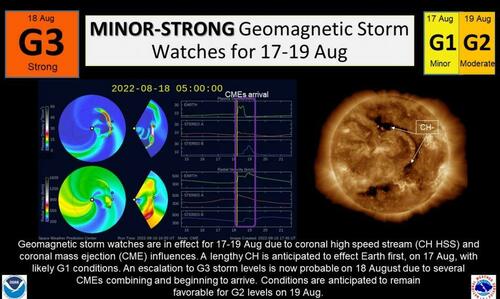An Earthbound ‘Cannibal Coronal Mass Ejection’ Event Could Be Imminent
A minor earthward-directed Coronal Mass Ejection (CME) already hit Earth’s magnetic field on Wednesday. NOAA’s Space Weather Prediction Center (SWPC) expects a more powerful earthbound CME to strike Thursday-Friday.
SWPC has already issued geomagnetic storm watches for a minor geomagnetic storm today, a strong geomagnetic storm on Thursday, and a moderate one on Friday.
The impacts will be insignificant now, but that could change tomorrow as a strong geomagnetic storm can spark power grid fluctuations, create satellite irregularities, and degrade radio and GPS signals. SWPC’s storm severity scale is 1-5.
A visual of the CME impacts on modern society.
Here’s more from spaceweather:
On Aug. 14th, a dark plasma eruption hurled one CME toward Earth. On Aug. 15th, an exploding magnetic filament launched another CME right behind it. The two CMEs will arrive together on Aug.18th, according to the latest forecast model from NOAA:
This could be a “Cannibal CME” event. In other words, the second CME might overtake and gobble up the first, creating a mish-mash of the two. Cannibal CMEs contain tangled magnetic fields and compressed plasmas that sometimes spark strong geomagnetic storms.
The first in a succession of SIX #solarstorms is hitting Earth now! NASA/CCMC’s Mary Aronne got this run spot on (see graphic). NOAA/SWPC has the other five hitting in machine-gun fashion starting on the 18th. Magnetic field is northward thus far but expect #aurora to build soon! pic.twitter.com/Q7i1nyuLY5
— Dr. Tamitha Skov (@TamithaSkov) August 17, 2022
Our “magneto”sphere is going to take a beating this week! Exciting times for you! Let’s get an X-class flare to give the uppercut! pic.twitter.com/WjvYWJ8Qql
— Dan Skoff (@weatherdan) August 17, 2022
Geomagnetic Storms will be visible to the naked eye in the US as far as Illinois and Oregon (geomagnetic latitude 50 degrees).
The sun is in a very active 11-year solar cycle called Solar Cycle 25, which began in December 2019.
The solar cycle peak is expected in 2025, but even before that, its presence will be felt on and around Earth via CMEs disrupting modern life.
Tyler Durden
Wed, 08/17/2022 – 17:40

